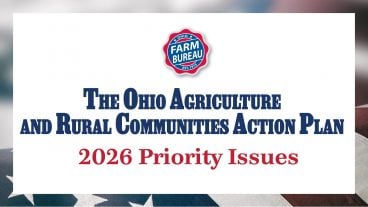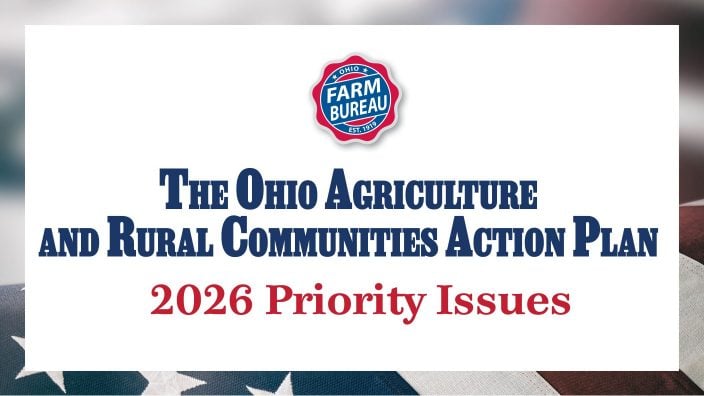The Ohio Agriculture and Rural Communities 2026 Action Plan
The plan provides a blueprint for policymakers and Ohio Farm Bureau members to bolster Ohio’s agriculture industry and our rural communities.
Read MoreUnlike the manufacturers of agriculture products and EPA regulators in Washington, farmers are not a part of the approval process, so transparency and forewarning of changes coming in the future needs to be considered.
Following the thorough review of a proposed label amendment, the U.S. Environmental Protection Agency has lifted the recent ban on the use of Enlist One and Enlist Duo in Ohio, providing growers with additional weed management options for the 2022 corn and soybean growing seasons.
“Today’s action is an example of EPA’s commitment to working with stakeholders when new information becomes available to make regulatory decisions that reflect the best available science and protect human health and the environment,” the EPA said in a statement.
This now reversed ban stemmed from a new process EPA has put in place when approving crop management products and their labels, in which the agency will evaluate products and their potential risk to species that are listed on the Endangered Species Act. For 12 counties in Ohio, the American Burrowing Beetle triggered the initial Enlist ban earlier this year.
“As the dialogue that we have had with EPA since the ban was announced progressed, we thought this change of heart might be happening, especially after Corteva submitted additional scientific data about the species in question,” said Brandon Kern, senior director of state and national policy with Ohio Farm Bureau. “EPA assessed the new data and determined that Enlist could be used during the 2022 growing season.”
Ohio Farm Bureau, along with other state Farm Bureaus and American Farm Bureau, expressed concerns about the ban and have had conversations with lawmakers in Washington and the highest levels of the EPA since January. Those early talks created awareness of the immediate impact such a ban would have on farmers who intended to use Enlist One and Enlist Duo this year, and in most cases who had already purchased the product. The precedent being set by this new process EPA is using to approve pesticide labels also was pointed out.
“Our hope is that this will serve as a test case of sorts to be able to show the shortcomings of how this process was handled,” Kern said. “If this creates a more workable regulatory rollout process when labels are evaluated in the future, that would be helpful.”
Kern said there is still a lot of work to do as far as learning how EPA and the U.S. Fish and Wildlife Service identify species at risk from pesticide applications. He pointed out that unlike the manufacturers of agriculture products and EPA regulators in Washington, farmers are not a part of the approval process, so transparency and forewarning of changes coming in the future needs to be considered.
“The end users of these products, that could be impacted by any future restrictions, should be a greater part of the overall process,” Kern said. “That will be part of our ongoing conversation with EPA moving forward.”


The plan provides a blueprint for policymakers and Ohio Farm Bureau members to bolster Ohio’s agriculture industry and our rural communities.
Read More

Leah Curtis joins this Legal with Leah to talk about what data centers mean for local communities and how to stay engaged in the development process
Read More

A recent state budget fix and a federal rule reform to H-2A have resulted in some relief for farmers who use the guest worker program.
Read More

Ohio Farm Bureau advocated for a change in the law to allow family members and employees to handle pesticides while under the supervision of a licensed applicator. The rules around HB 10 are being finalized.
Read More

Four property tax reform bills were signed into Ohio law at the end of 2025. Ohio Farm Bureau Associate General Counsel Leah Curtis breaks down the bills and what the changes mean for Ohioans.
Read More

A proposal to import beef from Argentina comes on top of the government shutdown and ongoing economic pressures facing agriculture.
Read More

Any unlicensed handlers who use restricted use pesticides will need to have additional training. Farm Bureau will be working on legislation to give employers a choice on how to provide training.
Read More

After nearly 100 days of traveling the nation and visiting directly with hundreds of farmers across America, U.S. Secretary of…
Read More

Over 20% of all the production in the United States from agriculture gets exported to a different country.
Read More

On this Ohio Farm Bureau Podcast, get an update on challenges borrowers are facing in 2025 from experts at Ag Credit and find out how the current state of agriculture is affecting the organization.
Read More